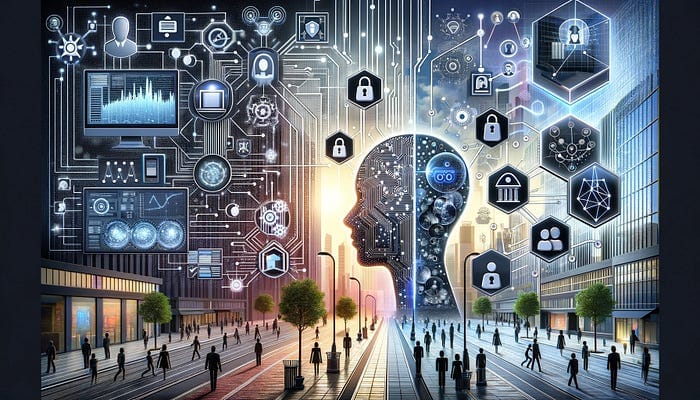Privacy and Anonymity in AI

With artificial intelligence (AI) pervasively integrated into our daily lives, it is imperative to comprehend and address its profound implications for privacy and anonymity. AI systems, ranging from basic automated responses to intricate machine learning models, offer significant enhancements in efficiency and convenience. However, they also pose substantial concerns regarding the management of personal information. This short essay examines the interplay of privacy and anonymity within AI, examines current protective measures, and anticipates future challenges and opportunities in this rapidly evolving landscape.
Privacy in AI refers to the ability of individuals to control access to their personal information and the extent to which this information is exposed to the AI and, by extension, to the entities that deploy AI systems.
Anonymity involves obscuring the identity of individuals so that the actions performed or the data provided cannot be traced back to them, even if the information itself is disclosed.
AI systems navigate privacy and anonymity in a complex manner. For instance, personalized AI assistants necessitate access to personal data for optimal functionality — data that encompasses user preferences, schedules, and even confidential communications. The cloak of anonymity may be jeopardized when AI systems can disclose data through pattern recognition and cross-referencing disparate data sets.
Adequate guardrails are essential to protect individuals from privacy invasions or anonymity breaches. Some safeguards may include legal and regulatory frameworks, technological solutions, ethical standards, or a combination of all of these.
Legal and regulatory frameworks like the General Data Protection Regulation (GDPR) and the California Consumer Privacy Act (CCPA) provide foundational guidelines for protecting personal information. They also offer users rights to access, correct, and delete their data.
Encryption, differential privacy, and secure multiparty computation are examples of technologies that help maintain confidentiality and anonymity in AI data. These techniques ensure that data can be helpful without exposing identifiable information.
Many organizations develop and follow ethical guidelines that include privacy considerations. These guidelines help design AI systems that respect user privacy and support anonymity.
While existing measures provide significant protection, several challenges persist. One of the main concerns is the AI’s capability for continual learning, which can lead to unintended privacy violations as systems learn more about individuals than initially intended. Additionally, the sophistication of AI in pattern recognition can sometimes pierce through anonymized data, identifying individuals from seemingly non-identifiable information.
The ongoing development of AI technologies will necessitate an evolution of privacy and anonymity protections. Future AI systems could incorporate advanced privacy-preserving technologies such as homomorphic encryption, which allows data to be processed in an encrypted state, providing utility without compromising privacy.
Privacy and anonymity are fundamental aspects that must be embedded in AI development and deployment. As AI continues integrating into daily life, ensuring these principles is not merely a technical challenge but a societal imperative. The future of AI should be guided by robust ethical frameworks, innovative privacy technologies, and stringent regulations to protect individual privacy and maintain trust in AI systems. By addressing these challenges head-on, AI can evolve into a tool that respects personal boundaries while providing vast benefits.
To summarize these critical concepts, privacy generally refers to your ability to control access to your personal information and who can see it. It’s about keeping specific details private, even if your identity is known. For example, you might choose who knows your address or financial information. Anonymity, on the other hand, is about concealing your identity so that actions or communications cannot be linked back to you. It protects your identity regardless of what information is disclosed, ensuring that you remain unidentifiable.
Both concepts are essential for personal security and freedom, but they serve different purposes.
Join Us Towards a Greater Understanding of AI
We hope you found insights and value in this post. If so, we invite you to become a more integral part of our community. By following us and sharing our content, you help spread awareness and foster a more informed and thoughtful conversation about the future of AI. Your voice matters, and we’re eager to hear your thoughts, questions, and suggestions on topics you’re curious about or wish to delve deeper into. Together, we can demystify AI, making it accessible and engaging for everyone. Let’s continue this journey towards a better understanding of AI. Please share your thoughts with us via email: marty@bearnetai.com, and don’t forget to follow and share BearNetAI with others who might also benefit from it. Your support makes all the difference.
Thank you for being a part of this fascinating journey.
BearNetAI. From Bytes to Insights. AI Simplified.
Categories: Artificial Intelligence, Technology Risks, Privacy and Data Protection, Ethics in AI, Information Technology, Legal and Regulatory Frameworks
The following sources are cited as references used in research for this BLOG post:
The Ethics of Artificial Intelligence and Robotics by S. Matthew Liao
The Age of Surveillance Capitalism: The Fight for a Human Future at the New Frontier — Power Academic Journals
Journal of Privacy and Confidentiality
Artificial Intelligence and Privacy — a report by the Privacy Commissioner of Canada. This document discusses AI’s privacy challenges and offers guidelines for managing these issues.
Ethics Guidelines for Trustworthy AI — by the European Commission’s High-Level Expert Group on Artificial Intelligence. This document provides a framework for ethical AI development, emphasizing privacy and data governance.
Privacy and Artificial Intelligence: Challenges for Personal Privacy and a Framework for Regulation — Harvard Journal of Law & Technology.
© 2024 BearNetAI LLC